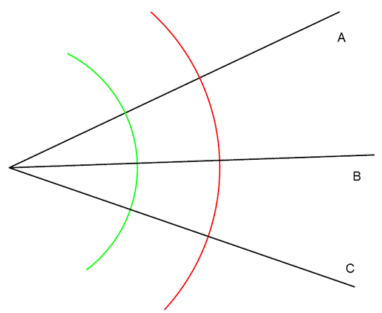Using the Trim command, you can remove parts of a drawing up to its intersection point or vertex. To explain this command properly, I will use the diagram shown here:

Here, we have three lines, A, B, and C, intersected by two arcs. We will trim the lines and arcs with respect to one another in the following examples:
- Select the Trim command from the Modify panel or use its command, TR.
- Hover your cursor over the A, B, or C lines on the right side of the red arc. You will notice that the color of the line will fade up to the red arc, indicating the part that will be trimmed.
- Click the line and it will be trimmed up to the red arc.
In this case, if you click another line or arc, it will be trimmed up to the next available boundaries. This is the default way that the trim command works in the 2021 version of AutoCAD.
However, if you are using older versions of AutoCAD, then the workflow will be slightly different. Here is the trim command's workflow for the older versions of AutoCAD:
- Select the Trim command from the Modify panel or use its command, TR.
- Now, the command line will prompt you to select the objects. Click on the green arc and press Enter.
- Now, click on the A, B, or C lines near the text and you will notice that the line will be trimmed up to the green arc, even though you have a red arc crossing the line before the green one.
In this case, you have selected the green arc as the boundary. So, it will trim the line with respect to the selected boundary only.
To include everything as a trimming boundary in older AutoCAD versions, select the Trim command again and press the Enter key directly, without making any specific selection from the drawing. The select all option is selected in the angle bracket and hence, pressing the Enter key selects all the objects in the drawing as trimming boundaries, as shown here:

This will select everything in the drawing area as a trimming boundary because the select all option is selected in the angle bracket, as in figure 2.66, and now if you click on any object, it will be trimmed up to the next boundary.
So, if you click on the A line somewhere near the A text, then the line will be trimmed up to the next boundary, which is the red arc, in this case. Selecting the same line again will trim it to the next boundary, which is a green arc, and so on. The last segment of the line will not be trimmed as there is no further trimming boundary.
Similar to the Trim tool, we have a tool that does the opposite of trim, that is, it will extend the object to the selected boundary. The workflow of the Extend tool is also similar to the Trim tool and we will discuss that in the next section.


























































